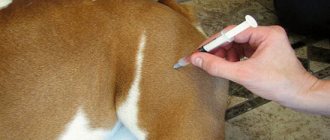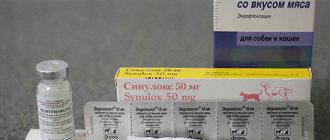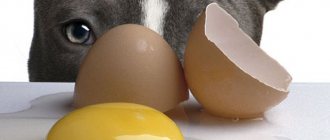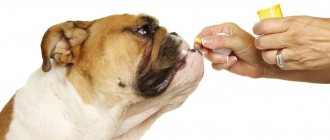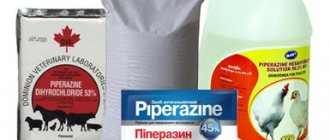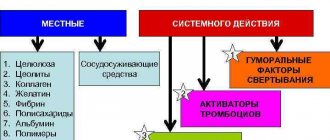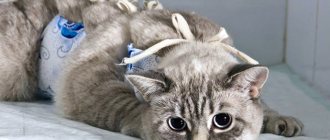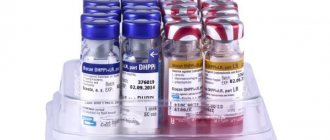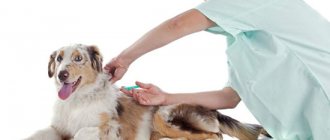Composition and release form
An anti-inflammatory drug is produced in the form of tablets and a solution intended for injections.
Injection
A clear, colorless liquid may sometimes have a light yellow tint. Packaged in glass bottles. They are hermetically sealed with rubber stoppers. The volume of the bottle is 20 ml.
The active ingredient is carprofen. 1 ml of medicinal liquid contains 50 mg. The composition also includes additional components:
- benzyl alcohol;
- sodium formaldehyde;
- lutrol F68;
- L-arginine;
- water for injections.
The solution is sold ready for use. It does not need to be diluted with a physical solution or other manipulations performed before use.
Pills
The active ingredient in Norocarp tablets used for dogs is also carprofen. When calculating the correct dosage, it is important to take into account the content of the active substance. Its concentration can be 20, 50 and 100 mg.
Auxiliary components are:
- magnesium stearate;
- sodium lauryl sulfate;
- polyvinyl porrolidone K30;
- lactose monohydrate, etc.
The round tablets are white in color. A dividing strip in the middle to measure out the required amount of medicine. They are usually packaged in blisters of 10 pieces, although there are also packages of 100 pieces in polymer bottles with a screw cap.
Rimadyl - properties and instructions
The drug Rimadyl belongs to non-steroidal anti-inflammatory drugs. Its properties are pain relief, inflammation and antipyretic effect. The active ingredient in Rimadyl is Carprofen, which is quickly absorbed into the blood from the digestive system.
Rimadyl is prescribed to dogs suffering from inflammation and joint pain. The diseases that cause them can be acute or chronic. Rimadyl is also effective for relieving swelling and pain in the postoperative period.
Rimadyl is used orally as prescribed by a doctor according to the same regimen as Norocarp. Give no more than 4 mg per 1 kg of pet’s weight per day. The daily dose of Rimadyl is divided into two doses. After a week, it is reduced exactly 2 times.
Rimadyl should not be given to puppy dogs and should be used with caution to treat puppies and pets with heart, liver, and kidney diseases. Possible side effects are vomiting and stomach irritation.
Actions and indications for use
The active life of dogs often causes diseases of the joints and spine, various damage to bones and soft tissues. Pathologies can occur in acute or chronic form, but are always accompanied by severe pain, inflammation, swelling and other unpleasant symptoms. The non-steroidal drug Norocarp will help relieve symptoms or reduce the suffering of the animal.
Carprofen blocks the production of a substance involved in the formation of inflammation. It has the following effect:
- relieves inflammation;
- reduces pain;
- lowers high body temperature;
- eliminates swelling.
According to the instructions, Norocarp for dogs is used for joint destruction and other pathologies that occur in chronic or acute form:
- for arthrosis;
- for arthritis;
- with coxitis;
- with osteochondrosis;
- with tendovaginitis, etc.
The medication is also prescribed:
- with dislocations;
- for fractures;
- when stretched;
- for other injuries;
- with soft tissue bruises;
- after operations;
- in inflammatory processes of any nature.
It is necessary to use Norocarp tablets for dogs according to the instructions and only after consulting a doctor. The drug has contraindications and side effects in case of overdose, so if used incorrectly it can aggravate health problems.
The main advantage of the drug is its rapid action. Peak concentration is reached in just 1-3 hours. When it enters the bloodstream, carprofen spreads throughout the body in a short time. The half-life is 8 hours.
Why do they give it?
Norocarp belongs to the group of non-steroidal anti-inflammatory drugs (NSAIDs, NSAIDs) of the latest generation. Thanks to the active substance, carprofen has a pronounced antipyretic and analgesic (painkiller) effect, supports the stable functioning of the digestive and cardiovascular systems.
Not being a narcotic substance, it is able to suppress pain at the level of the central nervous system, significantly reduce the production of destructive toxins at the site of inflammation, localizing it.
Due to its wide range of uses, norocarp is used:
- to relieve pain and swelling from bruises, injuries (including the spine), dislocations, fractures, sprains of muscles and tendons, in the postoperative period;
- for the treatment of chronic diseases of the musculoskeletal system (arthritis, arthrosis, intervertebral hernia);
- with inflammation of the tendons (tenosynovitis);
- to reduce high temperatures during inflammatory processes;
- to relieve severe muscle spasms.
What distinguishes norocarp from other drugs is the speed of its effect. The animal's condition begins to improve half an hour after administration, maximum pain relief occurs after 1-3 hours and lasts for 10-12 hours. The therapeutic effect lasts about a day.
Is it possible for animals?
Clinical trials and the results of veterinary practice have proven that when the correct dosage is observed, norocarp does not have a negative effect on the functioning of the kidneys, liver, gastrointestinal tract, or heart.
Even with long-term use, it does not accumulate in internal organs and does not have carcinogenic or irritating effects, does not worsen the composition of the blood and the immune properties of the body.
Important! In the dog's body, the active substances of norocarp are broken down in the liver and excreted from the body through the kidneys and intestines in the form of urine and feces after 16-48 hours.
Instructions for use
The principle of treatment and use of the medication directly depends on the dosage form.
Injection
Injections are given for quick pain relief in emergency situations. Subcutaneous or intravenous injections are done according to the following scheme:
- To calculate the correct dose of the first injection, it is necessary to take 4.0 mg of carprofen for each kilogram of the animal’s weight. 1 ml of the finished solution is designed for 12.5 kg of weight.
- If necessary, the injection is repeated every other day, but reducing the dose by half, that is, 2.0 mg of carprofen is needed per 1 kg.
- For further treatment, tablets are used.
It is prohibited to administer the medicine intramuscularly.
To administer the medication, you must use a disposable sterile syringe each time and be sure to follow all the rules of asepsis. Please note that the solution from an open bottle can only be used for 28 days, after which it must be disposed of.
Pills
The daily dose of the drug is calculated according to the scheme - 4.0 mg of carprofen per 1 kg of weight. For example, a 20 mg tablet is designed for 5 kg of animal weight. Usually the daily dose is divided into two doses. Since the drug can irritate the gastric mucosa, it is advisable to take it after meals.
You can give medication to your dog in different ways:
- Crumble and mix the resulting powder with a small amount of food. For these purposes, it is better to choose your pet’s favorite treats. For large dogs, whole tablets can be hidden in a piece of meat or chicken, minced meat.
- Dissolve the crushed tablets in a small amount of boiled water. Using a syringe without a needle, inject the resulting suspension into the animal’s mouth. The method is suitable for small pets.
- Inject the tablet forcefully by placing it on the root of the tongue. A special device can simplify this task.
Introducer for forced administration of tablets
If a medication is missed, you should return to the prescribed regimen as soon as possible. The exact dose, as well as the duration of treatment, must be calculated by the doctor. He will also give detailed recommendations for use.
After 7 days of treatment, the dose is halved, that is, to 2 mg of carprofen per 1 kg of weight. It is not recommended to use the product for a long time. In addition, it is used only to eliminate symptoms, and not to solve the cause of the pathology.
After surgical interventions, the drug is given once. If necessary, repeat the dose every other day.
Reviews from dog breeders
Lilia, Moscow. An elderly greyhound has chronic arthrosis, with periodic exacerbations. We go to the doctor and get a prescription for some non-steroidal anti-inflammatory drugs. The dog does not always react well; some tablets resulted in blood in the stool. Now they prescribed Norocarp, there seem to be no negative consequences, the dog feels good. I will continue to give it, the exacerbations will definitely not stop, because medications do not cure, but only relieve symptoms.
Many owners drink Norocarp in the form of a suspension by mixing tablets with water.
Timofey, Krasnoyarsk. The dog injured his paw, it didn’t seem too serious, but a lump formed, the dog began to limp and whine in his sleep. He didn’t let me touch his paw, it became clear that something was wrong. The doctor suspected inflammation of the periosteum, and they performed a puncture and x-ray. To relieve pain I prescribed Norocarp. The dog is not large and did not want to take the pills. I had to crush it and solder it out of the syringe. It seemed to get better, we drank for a week. But we can’t do without surgery, we’re preparing now, and the pills will probably come in handy.
Evgenia, Ufa. My dog had a benign tumor removed, the operation went well, but the recovery period was prolonged. Inflammation began, Norocarp was prescribed. On the first day I struggled with the pill; the dog couldn’t swallow it. Gradually I got the hang of it, throwing it straight into my mouth and holding the dog by the jaws. After a couple of days the dog got used to it, and the pills apparently helped, he clearly began to feel better. I noticed a slight upset stomach, but it’s not scary, after the operation I was more afraid of constipation.
Contraindications and side effects
According to the information specified in the instructions for use, Norocarp for dogs belongs to the third class of danger. If the recommended doses are followed, it does not have a negative effect on internal organs, does not cause mutations or addiction, but still, due to its strong effect, in some cases it is better not to take it.
Contraindicated in the following cases:
- up to 4 months of age;
- during pregnancy and lactation;
- when dehydrated;
- for liver dysfunction and liver failure;
- with severe kidney pathologies and renal failure;
- with ulcerative formations in the stomach or duodenum;
- with hemorrhagic syndrome;
- with hypovolemia (impaired blood circulation);
- with low blood pressure;
- for chronic heart diseases.
It is prohibited to take Norocarp with other non-steroidal and corticosteroid drugs. It is also prohibited to take it together with medications that thin the blood, diuretics and some types of antibiotics. Consulting a doctor will help you avoid unforeseen consequences.
If intolerance to the components has previously been observed, you should choose another pain reliever.
If the dose is exceeded or an allergic reaction occurs, the following symptoms may occur:
- vomit;
- diarrhea, as well as changes in the consistency, odor and color of stool;
- nausea;
- apathy and weakness;
- pallor of mucous membranes;
- stomach bleeding.
If such reactions occur, you must stop taking the medication. Depending on the manifestations, the doctor prescribes symptomatic treatment.
Do not take Norocarp without a doctor's prescription!
Norocarp
Description
Norocarp injection 5% 20 ml - non-steroidal anti-inflammatory drug as an active ingredient in 1 ml contains 5% carprofen and excipients: L-arginine - 3.1%, Lutrol F68 - 5%, benzyl alcohol - 1%, sodium formaldehyde - 0 .25% and water for injection up to 100%. It is an analogue of Ketofen (an analogue of Ketofen - norocarp).
Indications
Prescribed to dogs and cats for the treatment of inflammatory processes in acute and chronic diseases of the musculoskeletal system (arthrosis, arthritis, dislocations, edema, tendovaginitis, trauma), pain syndrome of various etiologies (traumatic and postoperative pain, herniated intervertebral discs, spinal injuries, etc. ). As a pain reliever in postoperative rehabilitation of an animal.
Doses and method of administration
For dogs, the drug is administered intravenously or subcutaneously at a dose of 4 mg of carprofen per 1 kg of animal weight (or 1 ml of injectable Norocarp per 12.5 kg of animal weight); to prolong the analgesic effect, the drug is re-administered after 24 hours at half the dose, i.e. 2 mg of carprofen per 1 kg of animal weight (or 1 ml of injectable Norocarp per 25 kg of animal weight). For cats, the drug is administered once intravenously or subcutaneously at a dose of 4 mg of carprofen per 1 kg of animal weight (or 0.08 ml of Norocarp injection per 1 kg of animal weight). If further therapy is necessary, dogs are given Norocarp tablets in accordance with the instructions for use. Norocarp injection is compatible with medications used for premedication and anesthesia of animals.
Pharmacological properties
Norocarp is a nonsteroidal anti-inflammatory drug (NSAID) that has anti-inflammatory, analgesic and antipyretic effects. Carprofen, like other NSAIDs of the latest generation, inhibits the enzyme cycloxygenase in the arachidonic acid cycle. In this case, the drug primarily affects cycloxygenase-II, which is produced in response to inflammation. As a result, the synthesis of prostaglandins is blocked. In therapeutic doses, carprofen has a much weaker effect on cycloxygenase-I, and therefore does not have a significant effect on the synthesis of protective prostaglandins. Thus, carprofen does not interfere with normal physiological processes in tissues, especially in the gastrointestinal tract, kidneys and platelets. In addition, the drug has anti-bradykinin activity, suppressing the perception of pain at the level of the central nervous system. Carprofen is quickly absorbed from the injection site, enters the blood and most organs and tissues, more than 99% of carprofen binds to plasma proteins. Metabolized in the liver, excreted mainly in feces (about 80%) and partially in urine. The half-life of carprofen from the body of dogs is about 8 hours, cats - about 19 hours. In terms of the degree of impact on the body, injectable Norocarp is classified as a moderately hazardous substance.
Side effects
With increased individual sensitivity of the animal to carprofen and an overdose, allergic reactions, vomiting, increased salivation, decreased or lack of appetite, diarrhea, depression, pain in the epigastric region on palpation, bleeding and ulcers of the gastrointestinal tract may be observed. If there are symptoms of an overdose, stop taking the drug and immediately consult a veterinarian.
Contraindications
Increased individual sensitivity of animals to carprofen. The drug should not be prescribed to pregnant and lactating females, puppies and kittens under 6 weeks of age, animals suffering from gastric and duodenal ulcers. The drug is not recommended to be administered at the same time with other non-steroidal anti-inflammatory drugs, glucocorticoids, diuretics and anticoagulants. If it is necessary to prescribe the above medications to an animal, they can be used no earlier than 24 hours after discontinuation of Norocarp injection or 24 hours before the start of its administration. Intramuscular administration of the drug is prohibited.
special instructions
Animals with kidney, liver and heart diseases should use Norocarp injection with caution under the supervision of a veterinarian.
Storage conditions
With caution. In a dry place, protected from direct sunlight and inaccessible to children and animals, separately from food and feed at a temperature of 3 to 25 ºС. Shelf life: 3 years. Opened bottles of the drug can be stored for no more than 28 days.
Manufacturer
Norbrook Laboratories Limited (Norbrook Laboratories Limited), Northern Ireland, UK.
Norocarp analogues
Ketofen.
Owner reviews
Margarita, owner of Newfowland:
“When our Martin started limping, we immediately went to the hospital. The doctor prescribed Norocarp. He said that the domestic analogue is Rimadyl, but recommended an imported drug. We drank for 6 days, the dog felt a little better, he started playing, but a month later the situation repeated itself, so I think the use of the medicine in our case was useless.”
Boris, Labrador owner:
“When our Labrador was 4 months old, he started limping. The doctor diagnosed “sclerosis of the elbow joint” and prescribed Norocarp. The dog tolerated the drug well, he felt better, but after a while the disease reasserted itself. The medicine relieves pain well, but does not cure joint diseases.”
Reviews about the drug
Irina : My cat is already 15 years old, she has all sorts of ailments, and recently she also stopped standing on her right hind leg. I contacted the veterinarian for advice. It turned out that she has age-related arthritis and needs to be injected with Norocarp. I doubted it for a long time, because this drug has many side effects. In addition, the cat suffers from kidney disease, and this is one of the contraindications to the use of Norocarp. But, nevertheless, I made up my mind, took my old lady to the clinic, gave her an injection, and prescribed additional medications. The pain has almost gone away, the cat began to stand on its paw, and no unpleasant consequences arose. I liked the injectable Norocarp, it really helps.
Alina : Not so long ago, I began to notice that my cat began to limp on both front legs, often lies down, does not run, does not play. I went to the vet, passed all the necessary tests, and took an x-ray. The doctor said that it was an intervertebral hernia in the cervical region and prescribed Norocarp tablets and Famotidine. I gave the cat these drugs, strictly observing the dosage, and within a week I saw a significant improvement. The cat stopped limping so much, became more mobile, and had an appetite. Despite the large number of side effects and contraindications, Norocarp helped us, without negative consequences.
Reviews from veterinarians
Veterinarians speak of Norocarp as a fairly powerful pain reliever. It is prescribed only for severe pain. Before the course of treatment, experts recommend doing a blood test for the animal. Anti-inflammatory drugs negatively affect the coagulation process and can cause bleeding.
Experts recommend monitoring your animal's stool during the course of treatment. If a dog experiences bloody diarrhea during therapy, the tablets should be discontinued.
Veterinarians also irritate the gastric mucosa. Therefore, specialists simultaneously prescribe the drug Ranitidine, which reduces the production of gastric juice. This allows you to reduce the aggressive effects of carprofen on the gastrointestinal tract.
Pharmacological properties
Carprofen in Norocarp is one of the latest generation anti-inflammatory substances. Its effect is manifested in:
- slowing down the processes of cellular metabolism in the animal’s body (thereby preventing the production of harmful substances in response to inflammation);
- suppression of pain perception, due to which the central nervous system does not suffer;
- extinguishing the source of inflammation;
- maintaining normal functioning of the digestive system, heart and circulatory system.
The therapeutic effect of the drug usually lasts up to 20-26 hours.
The breakdown process of Norocarp directly occurs in the liver, and its remains are excreted from the body as waste products. Based on the degree of impact on the body, Norocarp is classified as a moderately hazardous substance.
Price and analogues
The cost of Norocarp for dogs in pharmacy chains ranges from 2,000 to 4,500 rubles per 100 tablets. The price of the drug depends on the dosage. Blisters containing 10 tablets are also produced. Their cost is from 200 to 450 rubles.
Pet owners are often interested in cheaper drugs with similar effects. Complete structural analogues of the drug include:
- "Ketofen";
- "Rimadyl."
Let's look at these tools in more detail. Their active substance is also carprofen. The drug "Ketofen" can be used to treat small puppies aged 1.5 months. This medicine is available in the form of tablets and solution for injections. Its price ranges from 500 to 1,000 rubles.
"Rimadyl" tablets contain various flavoring additives. This product is also available in injection form. In terms of its effect on the body, this medicine is practically no different from Norocarp. The cost of the drug is from 500 to 800 rubles.
Restrictions
The prohibition on the use of the drug and the basis for the use of other anabolic steroids are:
- early age of kittens (less than 6 weeks);
- hypersensitivity to the components of the drug;
- pregnancy and lactation;
- peptic ulcer of the stomach or intestines.
Important!
Norocarp should not be used simultaneously with other non-steroidal anti-inflammatory drugs, corticosteroids, and some other medications.
An overdose can cause adverse reactions:
- decreased appetite and refusal to eat;
- vomiting;
- diarrhea;
- painful sensations in the abdomen;
- stomach and intestinal bleeding.
Norocarp injection for cats and dogs
The drug is a yellowish transparent liquid, packaged in dark glass bottles of 20; 50 ml.
The cost of 20 ml of Norocarp for injection and 50 ml of Norocarp for agriculture in July 2021 was 1980 and 2318 rubles.
The drug is prescribed for pathologies of the musculoskeletal system - arthrosis, arthritis, dislocations, bruises, as well as for the relief of postoperative pain.
Norocarp is administered intravenously or subcutaneously in an amount of 0.08 ml/kg body weight of a cat or dog. If necessary, the drug is administered to dogs every other day at half the dose. In case of an overdose, the animal is depressed, vomiting and gastric bleeding occur. Hypersensitive pets develop an allergic reaction, which is eliminated with antihistamines.
Norocarp is incompatible with glucocorticosteroids, anticoagulants, diuretics, and antiphlogistants. The medicine is contraindicated in animals with renal or heart failure.
